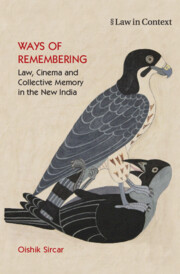Book contents
- Frontmatter
- Dedication
- Contents
- List of Figures
- Acknowledgements
- List of Abbreviations
- 1 Law and the Aesthetics of Atrocity
- 2 A Jurisprudential-Aesthetic Approach
- 3 The Best Bakery Judgments: Aesthetics of Judicial Memory
- 4 Bollywood’s Law: Cinematic Justice and Collective Memory
- 5 ‘As They Ought’
- Notes
- Glossary
- Bibliography
- Index
5 - ‘As They Ought’
Published online by Cambridge University Press: 30 April 2024
- Frontmatter
- Dedication
- Contents
- List of Figures
- Acknowledgements
- List of Abbreviations
- 1 Law and the Aesthetics of Atrocity
- 2 A Jurisprudential-Aesthetic Approach
- 3 The Best Bakery Judgments: Aesthetics of Judicial Memory
- 4 Bollywood’s Law: Cinematic Justice and Collective Memory
- 5 ‘As They Ought’
- Notes
- Glossary
- Bibliography
- Index
Summary
Really to forget something, you have to forget that you have forgotten.
You have to be ‘forgetful of forgetfulness’.
Ways of Remembering has examined the role secular law plays in the ways in which the Gujarat pogrom is collectively remembered in the New India. In this regard, I worked with two interrelated aims. The first was to offer a critical reading of two memorial narratives of Gujarat 2002 from the disciplinary vantage point of law in/as aesthetics scholarship. The second was to expand the understanding of what constitutes secular law by considering how law and justice are imagined in a broader cultural context, both inside and outside of conventional sources. The book has pursued these aims by developing a methodological orientation that enables the reading of the narrative compact of law and cinema in the making and ordering of collective memory. What has my reading shown, and what is the significance of what has thus emerged? This concluding chapter is organised around these two questions.
I have offered an account of the Gujarat pogrom by unpacking the shared narrative in the texts of the judgments of the Best Bakery case that ran from 2003 to 2012, and in three Bollywood films whose release coincided with this period (2004–13). I have read these texts by developing a novel methodological orientation which I have called the jurisprudential-aesthetic (J-A) approach. This reading has shown that law and cinema, together, are key elements shaping the collective memory of the pogrom. This shared narrative participates in the production, circulation and maintenance of ways of remembering which both condemn the violence and simultaneously facilitate a particular kind of state-making and state-preserving rationality that masks secular law's complicities with religious violence. This rationality is composed by the triad of secularism, legalism and developmentalism.
I locate this inquiry within a temporal and ideological frame called the New India. The first post-pogrom decade is surveyed as a concentrated period of collective memory making. It is in this decade, buoyed by the success of the Hindutva project in Gujarat, that Narendra Modi became India's prime minister in 2014.
- Type
- Chapter
- Information
- Ways of RememberingLaw, Cinema and Collective Memory in the New India, pp. 157 - 163Publisher: Cambridge University PressPrint publication year: 2024



